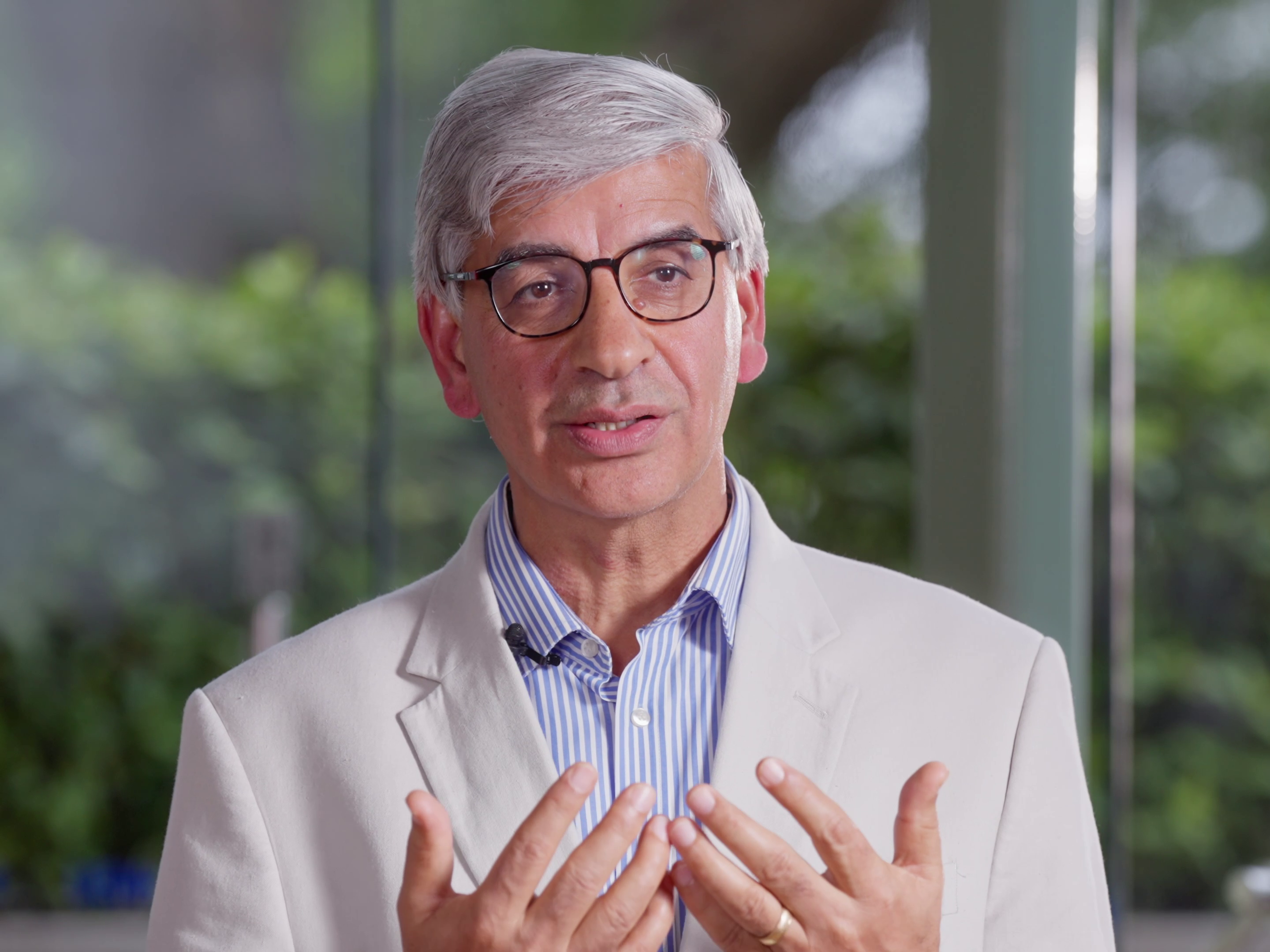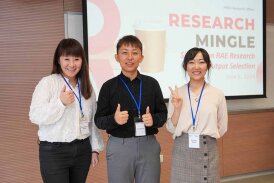Professor Daya Thussu, a Professor of International Communication in the Department of Journalism, School of Communication, was elected as the 13th President of the International Association for Media and Communication Research (IAMCR) in April 2024. He is the first IAMCR President based outside the West in the history of the 67-year-old academic and professional organization, and the first from Hong Kong Baptist University’s School of Communication to head a major international association. His four-year tenure commences in July 2024.
Click here to view the video of Professor Daya Thussu’s IAMCR Candidate Statementon YouTube.
“Professor Thussu is committed to internationalizing media research and has a track record of providing support and inclusion for scholars from all corners in the world” wrote Jairo Lugo-Ocando (University of Sharjah), UAE, in his nomination statement to IAMCR. “He dedicated his academic life promoting and supporting junior scholars from developing countries while having a strong presence and projection as a scholar and IAMCR advocate in the Global North”. Sujatha Sosale (University of Iowa) wrote in her endorsement letter, “His corpus of works has proved influential in shaping the thinking about globalization and the media over the last two decades. His vision and commitment to internationalize and maintain inclusiveness in IAMCR are a natural outcome of his life’s work in the field”.
A Professor of International Communication in the Department of Journalism, School of Communication, Thussu’s journey in academia spans over three decades. For much of that time, he was at the University of Westminster, London, where he founded and co-directed the India Media Centre and served as the research advisor to the China Media Centre. In 2018-2019, he was a visiting Distinguished Professor and Inaugural Disney Chair in Global Media at Schwarzman College, Tsinghua University, Beijing. His research focuses on the geopolitics of global communication with the aim of internationalising the field of communication to reflect transformational changes, especially in the global South.

Professor Daya Thussu
Thussu has authored and edited 20 best-selling books. One of his most cited books, International Communication: Continuity and Change, is currently in its third edition (Bloomsbury Academic, 2019) and has been translated into Mandarin and Korean. Drawing on a wide range of case studies in different cultural and political contexts, the book provides a comprehensive analysis of how recent technological developments and media expansion impact audiences, global media structures, geopolitical structures, and global markets. European Journal of Communication, in a review, described Thussu’s book as “a huge mass of material drawn together from international organizations, companies, and the trade press in an easily accessible format”. The book has been widely adopted as a textbook and reading material for courses on international communication across the world and continues to serve as a useful guidance for students and scholars interested in international communication as a subfield.
Beyond the domain of international communication, Thussu’s research explores global media studies and journalism research from an international perspective. “Although academics can sometimes be very territorial and specialist in their endeavours, for me, I haven’t just focused on one communication subfield in my academic career”, Thussu acknowledges. In another widely cited book, News as Entertainment: The Rise of Global Infotainment (Sage, 2007), Thussu forays into the emergence of a global infotainment sphere and explores the connections between journalism, news programming, and informed citizenship. The volume was the first book-length study of infotainment which details the way soft news hides the hard and harsh realities of geopolitical discourses.
Thussu maintains this research trajectory with his edited volume, Media on the Move: Global Flow and Contra-Flow (Routledge 2007) which critically analyses the dynamics of international flow of news and ideas. He argues, in the book, that the consumption of media products has moved beyond the international hegemony of the western media corporations. New media networks such as China Global Television Network (CGTN), Al-Jazeera, Deutsche Welle, and even film industries like Bollywood, and South Korean cinema (part of the Korean wave – Hallyu) have emerged around the world enjoying global viewership and garnering massive international following. The book captures the evolving flow of media products from the standard Anglo-American viewership to other regionalized audience base.
Originating from India, Thussu has dedicated a great deal of his academic career to bringing to the global academic stage, communication issues in the global south and to decolonizing communication research. His edited book, Internationalizing Media Studies (Routledge, 2009), part of a book series he edits for Routledge is a collection of essays that provides innovative perspectives on the specific realities of the challenges and opportunities of the media economy in non-western contexts and calls for the re-conceptualisation of media studies in the global South. Thussu’s many other research endeavours have provided the right foundational structure to understanding the global terrain of media studies in different geopolitical regions. His more recent co-edited books such as China’s Media go Global (Routledge, 2018), BRICS Media: Reshaping the Global Communication Order? (Routledge, 2021), among other notable works, are testaments to his contributions to soft power, public diplomacy, and foreign policy research.
Thussu is the founder and managing editor of the Sage journal, Global Media and Communication. In 2022, Thussu, alongside two RPg students, Anilesh Kumar and Vincent Wong, launched a talk series, ‘Global Ideas’. The series aimed at advancing the efforts of HKBU’s School of Communication to further internationalize research and scholarship and to create a platform for researchers, thinkers, and academics interested in global debates and dialogues in communication and beyond. The series featured prominent scholars and political commentators who deliberated on the current state of the global political, economic, and cultural landscape. Episodes of the talk series are available on YouTube.
Thussu continues to study international media structures, de-westernisation of communication research, and the geopolitics of information, infrastructure, and conflict. His latest book, Changing Geopolitics of Global Communication, which is currently under production by Routledge, is the first book-length study that analyses the dynamics between geopolitics and global communication. “This book is not just about news media, it is also about intellectual infrastructure, epistemic communities, and digital capitalism. I also have a section about decolonization of communication in a neo-liberal world as this field is still largely dominated and shaped by the US and western approach and the idea is to explore the asymmetries of the power relations”, Thussu says, “I have no doubt that this book will be useful to the global community of scholars and researchers in communication, international relations, and other related fields.”
Related Works
Thussu, D. K. (2024). Changing Geopolitics of Global Communication. Routledge.
Thussu, D. K., & Nordenstreng, K. (Eds.). (2021). BRICS media: Reshaping the global communication order? Routledge.
Thussu, D. K. (2018). International communication: Continuity and change. Bloomsbury.
Thussu, D. K., De Burgh, H., & Shi, A. (Eds.). (2018). China’s media go global. Routledge.
Thussu, D. K. (2009). Why internationalize media studies and how? In Internationalizing media studies (pp. 27-45). Routledge.
Thussu, D. K. (2007). News as entertainment: The rise of global infotainment. Sage
Thussu, D. K. (Ed.) (2007). Media on the move: Global flow and contra-flow. Routledge.
上一则消息
下一则新闻
05.06.2024




